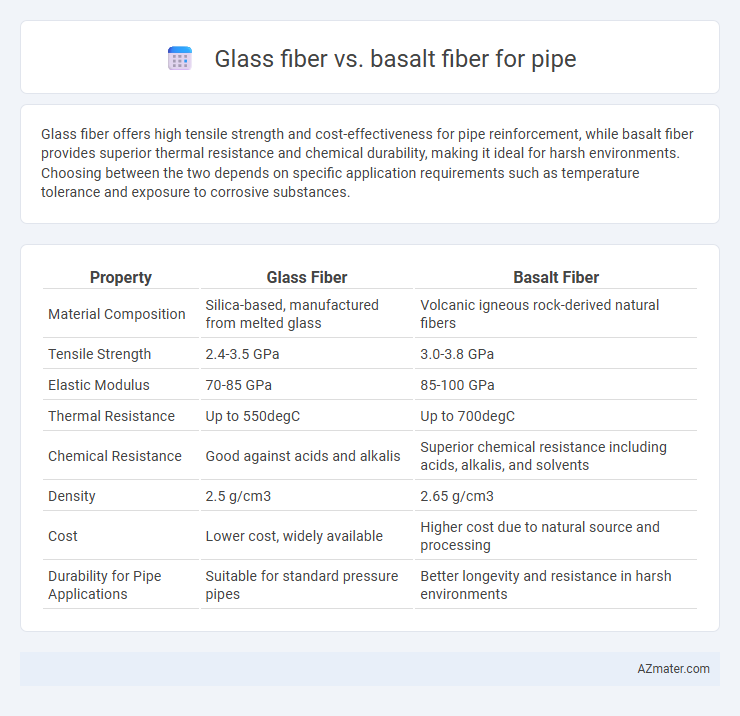Glass fiber offers high tensile strength and cost-effectiveness for pipe reinforcement, while basalt fiber provides superior thermal resistance and chemical durability, making it ideal for harsh environments. Choosing between the two depends on specific application requirements such as temperature tolerance and exposure to corrosive substances.
Table of Comparison
| Property | Glass Fiber | Basalt Fiber |
|---|---|---|
| Material Composition | Silica-based, manufactured from melted glass | Volcanic igneous rock-derived natural fibers |
| Tensile Strength | 2.4-3.5 GPa | 3.0-3.8 GPa |
| Elastic Modulus | 70-85 GPa | 85-100 GPa |
| Thermal Resistance | Up to 550degC | Up to 700degC |
| Chemical Resistance | Good against acids and alkalis | Superior chemical resistance including acids, alkalis, and solvents |
| Density | 2.5 g/cm3 | 2.65 g/cm3 |
| Cost | Lower cost, widely available | Higher cost due to natural source and processing |
| Durability for Pipe Applications | Suitable for standard pressure pipes | Better longevity and resistance in harsh environments |
Introduction to Fiber-Reinforced Pipes
Fiber-reinforced pipes utilize composite materials such as glass fiber and basalt fiber to enhance strength, corrosion resistance, and durability in industrial applications. Glass fiber pipes offer high tensile strength and cost-effectiveness, making them suitable for a wide range of chemical and water transport systems. Basalt fiber pipes provide superior thermal stability and resistance to alkaline environments, ensuring long-term performance in more demanding conditions.
Overview of Glass Fiber
Glass fiber, composed of fine strands of silica-based glass, is widely used for pipe reinforcement due to its high tensile strength, corrosion resistance, and lightweight properties. Its excellent thermal stability and electrical insulation capabilities make it ideal for various industrial piping applications, including chemical and water transport systems. Compared to basalt fiber, glass fiber offers superior cost-effectiveness and well-established manufacturing processes, making it a preferred choice for reinforced composite pipes.
Overview of Basalt Fiber
Basalt fiber, derived from volcanic basalt rock, exhibits superior thermal stability, chemical resistance, and mechanical strength compared to traditional glass fiber, making it an excellent choice for pipe reinforcement in demanding environments. Its natural composition provides enhanced durability against corrosion, high temperatures up to 650degC, and UV exposure, significantly extending the lifespan of pipes used in industrial and infrastructural applications. Basalt fiber's eco-friendly production process and recyclability further contribute to sustainable piping solutions, positioning it as a high-performance alternative to glass fiber.
Mechanical Properties Comparison
Glass fiber pipes exhibit high tensile strength ranging from 2,400 to 3,500 MPa, providing excellent resistance to mechanical stress and impact. Basalt fiber pipes offer superior compressive strength, often exceeding 2,800 MPa, and enhanced thermal stability, making them more resistant to deformation under high-pressure conditions. Compared to glass fiber, basalt fiber also demonstrates better fatigue resistance and higher modulus of elasticity, contributing to improved durability and load-bearing capacity in pipe applications.
Chemical Resistance and Durability
Basalt fiber exhibits superior chemical resistance compared to glass fiber, especially against acidic and alkaline environments, making it ideal for harsh industrial pipe applications. The enhanced durability of basalt fiber pipes stems from their natural resistance to corrosion, thermal stability, and mechanical strength, which outperform traditional glass fiber pipes under prolonged exposure. Glass fiber pipes, while cost-effective, tend to degrade faster in aggressive chemical environments, reducing their lifespan and increasing maintenance needs.
Thermal Performance Analysis
Basalt fiber exhibits superior thermal performance compared to glass fiber due to its higher melting point of approximately 1450degC, enabling enhanced thermal stability in pipes exposed to extreme temperatures. Glass fiber typically melts around 1200degC, limiting its effectiveness in high-temperature environments and increasing the risk of degradation under thermal stress. The improved thermal resistance of basalt fiber aids in maintaining structural integrity and insulation properties in industrial piping applications subjected to intense heat.
Weight and Density Considerations
Glass fiber pipes typically have a density of about 2.54 g/cm3, making them heavier compared to basalt fiber pipes, which exhibit a lower density around 2.67 g/cm3. Despite the slight difference in density, basalt fiber offers a superior strength-to-weight ratio, which can reduce overall pipe weight and improve handling and installation efficiency. Weight considerations are critical in pipeline applications where ease of transport and support structure load are key factors.
Cost and Availability
Glass fiber pipes typically offer lower initial costs and widespread availability due to established manufacturing processes and global supply chains. Basalt fiber pipes, although more expensive, provide superior durability and resistance to chemicals and high temperatures, making them a cost-effective choice over time in demanding environments. Availability of basalt fiber remains more limited compared to glass fiber, impacting lead times and overall project costs.
Environmental Impact and Sustainability
Basalt fiber pipes exhibit superior environmental benefits compared to glass fiber pipes due to their natural raw material sourced from volcanic rocks, resulting in lower energy consumption and reduced carbon emissions during production. Glass fiber manufacturing involves higher energy use and emits more greenhouse gases, impacting sustainability negatively. The durability and corrosion resistance of basalt fiber pipes contribute to longer service life and less frequent replacement, further enhancing their eco-friendly profile.
Application Suitability and Recommendations
Glass fiber offers high tensile strength, chemical resistance, and cost-effectiveness, making it suitable for general-purpose piping in water treatment, chemical processing, and HVAC systems. Basalt fiber provides superior thermal stability, corrosion resistance, and mechanical performance at elevated temperatures, ideal for industrial pipes exposed to harsh environments such as oil and gas, marine, and high-temperature applications. For standard piping needs, glass fiber is recommended due to affordability and versatility, whereas basalt fiber is preferred for specialized or extreme conditions demanding enhanced durability and heat resistance.

Infographic: Glass fiber vs Basalt fiber for Pipe
 azmater.com
azmater.com